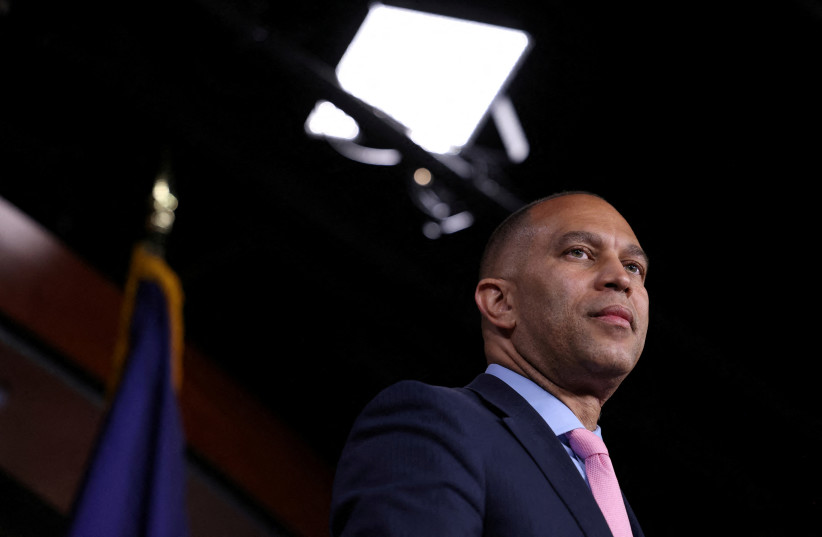On the surface, comments US House Minority Leader Hakeem Jeffries (D-New York) made to the press this week about support for Israel sounded like standard boilerplate.
“The Democratic Party in the House of Representatives will continue to stand with Israel in lifting up the special relationship between our two countries and in support of Israel’s right to exist as a homeland for the Jewish people and as a Jewish democratic state,” he said. “Period. Full stop.”
"The Democratic Party in the House of Representatives will continue to stand with Israel in"
US House Minority Leader Hakeem Jeffries (D-New York)
However, considering some recent headlines regarding the supposed fading support for Israel among Democrats, Jeffries’s comments – while leading a delegation of more than 20 Democratic lawmakers, most of them freshmen, organized by the AIPAC-linked American Israel Education Foundation (AIEF) – are not without significance.
On July 16, Pramila Jayapal (D-Washington), the head of the Congressional Progressive Caucus, which has 103 house members, called Israel a “racist state.”

She faced strong pushback and came under a barrage of criticism for her words, including from Jeffries, and later backtracked, saying she didn’t mean that the “idea of Israel as a nation is racist,” but rather that Netanyahu’s “extreme right-wing government has engaged in discriminatory and outright racist policies and that there are extreme racists driving that policy within the leadership of the current government.”
Her words prompted the Republicans to bring a resolution to the House floor asserting that Israel “is not a racist or apartheid state” and that the US “will always be a staunch partner and supporter of Israel.”
That resolution passed by a whopping 412-9, with one abstention.
However, the headline in a couple of newspapers the next day, including one in Israel, was not that the resolution passed overwhelmingly, but rather: “Nine Democrats vote against GOP resolution calling Israel ‘not racist.’” That would be akin to Belgium beating Israel in a World Cup qualifying match 20-1, and the headline the next day reading: “Israel scores goal against Belgium.”
These types of headlines drive the narrative that Israel is losing the Democrats, a narrative many people with wildly different agendas are interested in promoting.
Who wants the world to think Israel is losing the Democrats? First, the Israeli opposition and the leaders of the anti-judicial reform protest movement. They want to create a perception that everything in the country is turning sour: the military, the economy, the health system, and Israel’s relations with the world; first and foremost, with the US.
Yesh Atid’s head Yair Lapid repeats almost as a mantra that Prime Minister Benjamin Netanyahu and this government have destroyed relations with the US.
While the polls do show that Democrat support for Israel is slipping, it is a process that predates Netanyahu.
Counterintuitively, support among Democrats for Israel during the period when Netanyahu was prime minister from 2009-2021 averaged 50%, according to Gallup’s world affairs poll, six points higher than the average of polls taken from 1999-2009 when he was not the prime minister.
Furthermore, it is not as if the Bennett-Lapid governments, the most diverse in the state’s history, succeeded in garnering a wellspring of Democratic support.
What do the Republicans gain from anti-Israel sentiment?
Who else is interested in creating the perception that Democrats are being taken over by its anti-Israel minority? The Republicans.
To win over voters from Christian and Jewish constituencies for whom Israel is a top priority, the Republicans are interested in portraying the Democrats as an anti-Israel party that has turned its back on the Jewish state.
And then along comes Jeffries with nearly two dozen freshman Democratic lawmakers touting the importance of the Israel-US relationship, saying all the right things, and presenting a picture of business as usual even as Israel is embroiled in the judicial reform debate. What this does is put things in better proportion.
Obviously, those in the party’s anti-Israel wing, such as Rashid Tlaib and Ilhan Omar, would have preferred that this show of support for Israel did not take place.
Likewise, some in the anti-judicial reform camp would also have preferred that this visit not take place, to deprive the government of any legitimacy. When trying to portray Israel as a country that, under this government and with the judicial overhaul, will turn into an international pariah, this type of visit punctures that narrative.
Also among Republicans, there are certainly those who are not thrilled by a Democratic show of support for Israel, since they want to portray their party as the pro-Israel party and the Democrats as an anti-Israel one.
The visiting Democratic delegation, one that also includes some progressive members critical of Israel, puts a dent in that narrative. It should also be remembered – and New York Congressman Ritchie Torres is the best example of this – that it is possible to be progressive and strongly supportive of Israel.
Nonetheless, Israel cannot ignore some disturbing trends inside the Democratic Party, such as the recent call by Maryland’s Democratic Senator Chris Van Hollen for the US to reassess military aid to Jerusalem.
A look at the nine Democrats who voted against Israel in July also gives a peek at the dimensions of the problem.
The following nine Democrats, all members of the Congressional Progressive Caucus, voted against the “Israel is not racist” measure: Alexandria Ocasio-Cortez (New York), Tlaib (Michigan), Jamaal Bowman (New York), Summer Lee (Pennsylvania), Omar (Minnesota), Cori Bush (Missouri), André Carson (Indiana), Delia Ramirez (Illinois) and Ayanna Pressley (Massachusetts). Representative Betty McCollum (D-Minnesota) voted “present.”

Those concerned that this means the US House of Representatives is turning against Israel should remember that these nine members represent only 2% of the 435 members of the House of Representatives – not exactly a tidal wave against Israel. Among Democrats in the House, this is only 4% of the 213 Democratic members. Even considering that some other House members might share these sentiments, it is still a tiny minority.
What Israel does need to take into consideration is that this group represents nearly 9% of the Congressional Progressive Caucus. Perhaps more concerning, six of the nine who voted against Israel are members of the Congressional Black Caucus, which means that some 11% of this caucus voted against a resolution saying that Israel is not a racist state.
That figure also needs to be put in perspective, since 11% is relatively small. Still, if only 2% of the House voted against the resolution, but 11% of the members of the Black Congressional Caucus did so, that indicates a problem with a significant demographic to which Israel should be paying particular attention.
